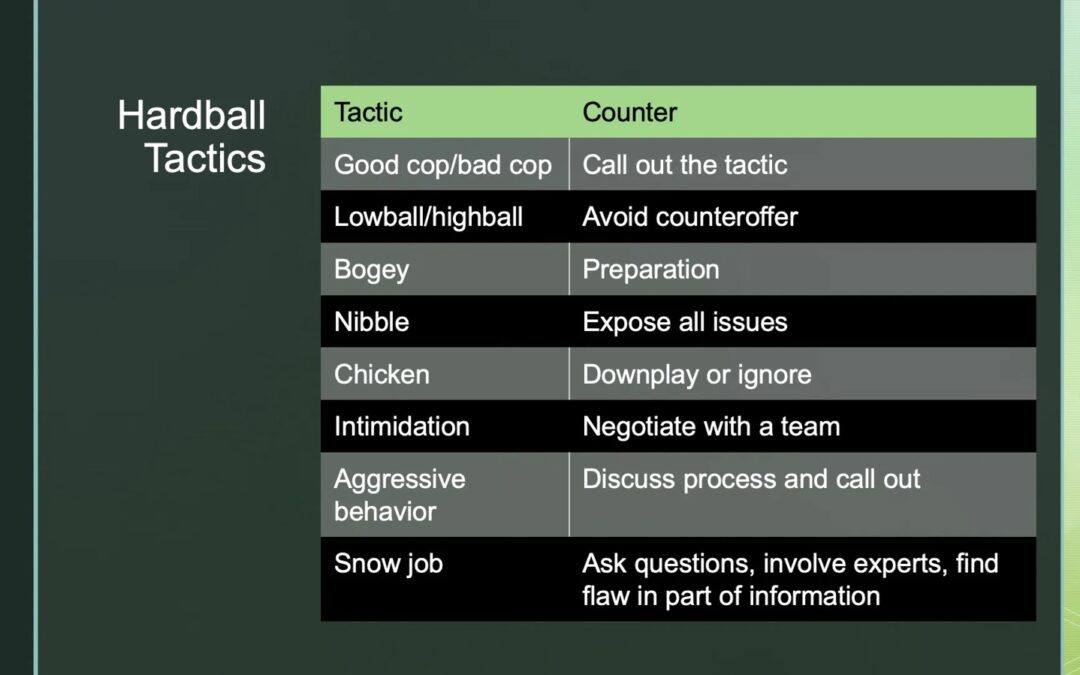Anyone who has been in multiple negotiations has dealt with dirty, hardball tactics. Maybe you’ve even used them yourself in an attempt to gain the upper hand. While related to negotiations focused on changing the rules, hardball tactics are in a little different category. Most importantly, hardball tactics are all about short-term gain with no thoughts toward long-term cost. Supply chain and procurement are about relationships, and hardball tactics always undercut those relationships. So today we’re going to talk about the main hardball tactics and (more importantly) how to counter them.
Good Cop/Bad Cop
Most people are familiar with the good cop/bad cop tactic. This is where two negotiators work together with one being rude, tough, and mean and the other being kind, seemingly accommodating, and friendly. It works because we want to gravitate toward the “good cop”, whose offers suddenly sound more reasonable beside the “bad cop’s” harsh style.
To counter this tactic, call out the behavior to deflate the tactic. Mention that you see your negotiation partners are using a good cop/bad cop tactic, and that you don’t appreciate it. Emphasize your commitment to the relationship and to finding the right negotiation outcome for all parties.
Lowball/Highball
The lowball or highball tactic is also well-known, and is when one party in a negotiation starts with an unreasonably high or unreasonably low offer. This offer is so far out of the realm of reality that it’s laughable and is certainly not focused on a sustainable business relationship. It works because it subconsciously “anchors” us to the unreasonable offer, making the next offer feel more reasonable or forcing us to counter either much higher or much lower than we intended.
To counter this tactic, don’t make a counteroffer. Insist the offer is unreasonable, and force the highball/lowball party to make a more reasonable offer. Stay calm, and try not to let the abnormal offer change your initial framing of the negotiation topic’s true value.
Bogey
The bogey tactic is when a negotiation party pretends an unimportant issue is important, such as asking for extra fees to expedite an order which is already built and sitting in inventory. It works because the “important” topic will be reasonable (such as an expedite fee), and it works best when the other party doesn’t know what is truly important.
To counter this tactic, information is everything. Know going into the negotiation what is most important to the other party and gather as much information as possible about their limitations. This is also where a relationship is important, because it’s often harder to lie to professional contacts we know well and know we will continue to work with.
Nibble
The nibble tactic is when one party asks for small concessions on an unrelated parameter to seal the deal, like asking to add a logo to the side of the box. This is a hardball tactic when it comes up at the last minute and becomes a deal-breaker for the rest of the negotiation. I personally struggle with this one as a hardball tactic. If the desire is presented early enough and with the right justifications, it can instead be a non-monetary win-win.
To counter this tactic, continue asking what else is needed or desired until all issues are on the table. Don’t let the nibble lengthen a negotiation or “nickel and dime” the costs at the end of an otherwise good deal.
Chicken
Chicken is when one party displays a raw threatening force, essentially trying to bully the other party to conceding a point. It works because it can be very physically and psychologically intimidating, and tends to play up emotions.
Counter the chicken tactic by downplaying or ignoring the intimidation factor. Don’t allow the intimidating party to rile you up or otherwise derail the negotiation. This is also where having a team at the negotiation table can be helpful, because at least one team member can continue the negotiation while the target of the chicken tactic takes a break.
Intimidation
Another place where having a negotiation team can be helpful is in countering the intimidation tactic, which is where one party tries to force agreement through anger, fear or guilt. It works because as Brené Brown says, “we are emotional, feeling beings who on occasion think” instead of thinking beings who occasionally feel.
To counter the intimidation tactic, have a team at the negotiation table (whether that table is proverbial or literal). It’s very hard to intimidate a group of people at once, and even harder to play on the emotions of a group of people equally. Note that you may have to bring some “higher rank” employees in your company into the negotiation table so the other party cannot intimidate simply by bringing in more VPs.
Aggressive Behavior
The aggressive behavior tactic is when one party relentlessly pushes the other or asks for large concessions early in the negotiation. It works because negotiations can be all about momentum, and being aggressive automatically makes the other party defensive. It’s much harder to get the concessions you’re looking for when you’re on the defense.
To counter aggressive behavior, discuss the negotiation process and expected steps. Call out the aggression as unprofessional and inappropriate, similar to countering the good cop/bad cop tactic.
Snow job
The last major dirty negotiation tactic we will discuss today is the snow job. This is when one party tries to overwhelm the other with data, information, and technical details. It works because the parties at the negotiation table are often not the technical experts, and the flood of information is hard to process.
Counter the snow job tactic by continuing to ask questions, leaning into understanding all of the additional information offered. Bring in technical experts to better process the additional information, and try to find a flaw in the information offered. By invalidating a piece of the data, you can effectively invalidate the whole avalanche.
Dirty negotiation tactics can be tricky to deal with, as they often play on our emotions to pull us out of calm, logical negotiation. Don’t use them yourself, and be ready to recognize and counter them when used against you. Simply recognizing dirty tactics goes a long way toward bringing a negotiation back to relationship-building and win-win results. To discuss an upcoming tricky negotiation, schedule some time on my calendar.




